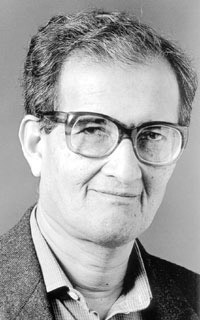Amartya Sen: Difference between revisions
m (Infobox update) |
m (Infobox5 upgrade) |
||
| Line 1: | Line 1: | ||
'''Amartya Sen''', Indian [[economist]] and winner of the Nobel prize in 1998, the theorist of welfare [[Economics]] that focuses on the study of the causes of poverty and the scourge of hunger.. | '''Amartya Sen''', Indian [[economist]] and winner of the Nobel prize in 1998, the theorist of welfare [[Economics]] that focuses on the study of the causes of poverty and the scourge of hunger.. | ||
[[Image:Amartya_Sen.jpg|thumb|Fig. 1. Amartya Sen]] | [[Image:Amartya_Sen.jpg|thumb|Fig. 1. Amartya Sen]] | ||
| Line 34: | Line 17: | ||
* "Collective Choice and Social Welfare", San Francisco: Holden Day, 1970 | * "Collective Choice and Social Welfare", San Francisco: Holden Day, 1970 | ||
* "Poverty and Famines: An Essay on Entitlement and Deprivation", Oxford: Clarendon Press, 198l | * "Poverty and Famines: An Essay on Entitlement and Deprivation", Oxford: Clarendon Press, 198l | ||
{{infobox5|list1={{i5link|a=[[Feminist economics]]}} — {{i5link|a=[[Thorstein Veblen]]}} — {{i5link|a=[[John Stuart Mill]]}} — {{i5link|a=[[Gary S. Becker]]}} — {{i5link|a=[[Milton Friedman]]}} — {{i5link|a=[[Socialism]]}} — {{i5link|a=[[John Maynard Keynes]]}} — {{i5link|a=[[Full employment]]}} — {{i5link|a=[[Adam Smith]]}} — {{i5link|a=[[Test report]]}} }} | |||
==References== | ==References== | ||
Revision as of 14:11, 17 November 2023
Amartya Sen, Indian economist and winner of the Nobel prize in 1998, the theorist of welfare Economics that focuses on the study of the causes of poverty and the scourge of hunger..
Amartya Sen was born 3 November 1933 in Bengali. He came from a wealthy family and has never known scarcity. His father was a chemistry professor and his mother a writer and editor of the literary magazine in Bengal. As a young man Sen thought about studying Sanskrit. Later, before settling on economics he was interested in mathematics and physics. From the beginning he knew that he wanted to become a university teacher. He began to study mathematics and Economics at University Visva-Bharati. Since 1951 he continued his studies in Calcutta. He then left India and began his studies in Trinity College in Cambridge. During these studies he returns for 2 years in India, where much to the displeasure of other professors, he was offered the opportunity to create a new Department of Economics in Jadavapur University. Sen is not discouraged, finishes with a thesis and obtains a scholarship. After defending his phD thesis, he decided to pursue further studies – this time in philosophy.
In 1963, he became a professor of economics at Delhi School of Economics and at Delhi University. Soon after the publication of "Collective Choice and Social Welfare" he moved to London, where he became a Professor at the LSE. In 1981 he published his most important work "Poverty and Famines - An Essay on Entitlement and Deprivation" in which he confronts the traditional theses on the causes of poverty and hunger. In the late eighties his second wife dies. Sen together with two children moved to America, where he teaches at various universities (Stanford, Berkeley, Yale, Princeton, Harvard, UCLA, and others). Eventually, he settled in Boston, where he got a job at Harvard as Professor of Economics and philosophy. In 1990 he took part in the drafting of important UNITED NATIONS development aid guideline – Human Development Index. In 1998, Amartya Sen was awarded the Nobel Prize in economics for his contributions in the economics of prosperity and social choice theory.
Basic views
- One of the conditions for development and prosperity is the participation of as many different social groups in making economic decisions
- Is not a supporter of the opinion that GDP per capita was well acquainted with the reality in the country
- In addition to economic benefits and profits he underscores also the ethical and axiological determinants of decision
- Is a supporter of equal rights for women.
- Prerequisite for development is the freedom of expression and information.
Major works
- "Growth Economics", editor, Harmondsworth: Penguin Books,1960
- "Collective Choice and Social Welfare", San Francisco: Holden Day, 1970
- "Poverty and Famines: An Essay on Entitlement and Deprivation", Oxford: Clarendon Press, 198l
| Amartya Sen — recommended articles |
| Feminist economics — Thorstein Veblen — John Stuart Mill — Gary S. Becker — Milton Friedman — Socialism — John Maynard Keynes — Full employment — Adam Smith — Test report |
References
- Dreze, J., & Sen, A. K. (1991). Hunger and public action (p. 392). Clarendon: Oxford.
- Sen, A. (2001). Development as freedom. Oxford Paperbacks.
- Sen, A. (1992). Inequality reexamined. Clarendon Press.
